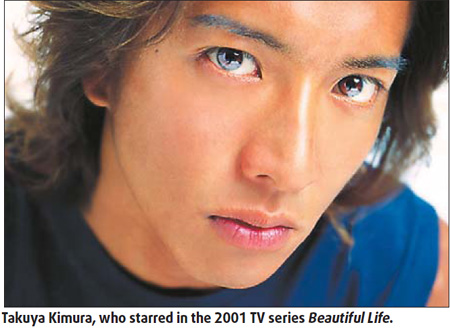
|
OPINION> Raymond Zhou
 |
|
China's J-lovers
By Raymond Zhou (China Daily)
Updated: 2009-08-11 07:59
 Last Tuesday night, Noriko Sakai (酒井法子) left home with her 10-year-old son. The police and her employer launched a nationwide search. Sakai is a Japanese pop singer and actress. It is reported she was desperate and could be suicidal after her Don Juan of a husband was arrested for possessing illegal drugs. It is a story that naturally made the headlines in Japan, but it also filled many Chinese hearts with anxiety. People left words of hope and blessings on Chinese Web forums. All this because Sakai starred in Hitotsu Yane no Shita (同一屋檐下) and Heaven's Coins, two of her drama series that were aired in China in the early 1990s. Her album Smile soon followed. She then starred in a Panasonic commercial customized for the Chinese market, in which she chirped the jingle in Chinese.
Her innocent smile and unique way of pronouncing Chinese words endeared her to a whole generation of Chinese TV watchers. Sakai is not alone. She is among a cadre of Japanese entertainers with a sizeable following in China. Their fame on this side of the East Sea is not always recognized in their homeland because China's importation of entertainment products was haphazard in the early years. Even so, they achieved an outsized influence because there was less competition on the Chinese tube. It all started in the early 1980s when Sino-Japanese relations were enjoying a rare warm breeze. A Guangdong TV station aired Akai Giwaku (血疑), a melodrama about a teenage girl who was poisoned by radiation and suffered an extended near-death breakdown before finally succumbing to it. It starred Momoe Yamaguchi (山口百惠), Japan's top idol at the time, who retired from the entertainment business in 1980, at the tender age of 21. Yamaguchi, with her guileless charm, created in China an avalanche of audience interest. Her music, often used as theme songs for her movies and in TV dramas, received non-stop airplay and was covered by many Chinese singers, including Hong Kong's Anita Mui. Every Japanese visitor was probed for information about our mutual favorite star, who vanished from the spotlight and into full-time homemaking. In the 1980s, television penetration in China was growing but most sets had just three channels. A popular show literally had half the nation watching. J-pop was not tracked quite so closely, but it made its mark. A few years ago, Shanghai held a concert for nostalgia lovers with singers from Japan. It was met with derision online, but youngsters today can hardly understand how popular it was in the newly opened mainland. One of these songs, Subaru (星), by Shinji Tanimura (谷村新司), was hummed by a character in last year's runaway hit movie If You Are the One.
Now, the young generation is hooked, but few are aware that some 30 of the top names in the mainland, Hong Kong and Taiwan pop arena have covered it and a whole generation who grew up in the 80s embraced it. The 1990s brought more drama series and love stories from the Land of the Rising Sun. But the viewing platform shifted. More people kept in touch with J-pop via cassettes and discs, which offered a wider spectrum of selections. According to Yu Shanshan, an editor with a Beijing-based newspaper, serious fans of all things Japanese, known as "J-lovers" in China, are those aged 20-30. That means, those who fell in love with Yamaguchi and her peers are not included. What caught the eyes of Yu was Beautiful Life, a 2001 TV series with Takuya Kimura (木村拓哉) and Takako Tokiwa (常盘贵子). The story was heartbreaking, and the stars refreshingly youthful. She shed buckets of tears and dug up earlier works by these and other artists. She also broadened her scope to other genres, which now includes detective series. Another reason Yu prefers Japanese soap operas are their manageable length, which are usually less than a dozen episodes. She also delights in the angelic and cartoon-like images, which are never as hard-hitting as American series, but still manage to include useful knowledge, such as that of autism. Japanese pop culture reached its peak in the 1990s in China, explains Tan Fei, an entertainment industry veteran and culture critic. It gave way to Korean pop. Nowadays, with Internet access and endless options it's hard for a whole nation of couch potatoes to be addicted to soap operas from only one country. "The J-pop craze is not declining. What you see is just the manifestation of more choices," argues Sun Jianjun, professor of Japanese language at Peking University. Sun has observed that even people who are not proficient in the language are glued to historical dramas that may not even have a big following in Japan. He hopes more soap opera can be imported so that locals don't have to watch pirated discs or download illegally. As for Sakai's popularity in China, "Class 95" of Tsinghua University is said to be the earliest Chinese fan base because the techno-savvy students had online access before almost anybody else did. And since they resided in the number 9 dormitory, "9#" was twisted into the homonym Sakai, in Chinese. Obviously more have followed suit and become ardent fans. Now some of them are debating whether to support her through the coming weeks. Sakai was arrested on Saturday night. Cops obtained evidence that she was also taking drugs and her husband made a similar confession. Like her Japanese fans, people here in China are also caught in a quandary between defending their idol and lamenting her downfall. Sakai's company, Sun Music, apologized to her Chinese fans in a statement: "Whatever the verdict, we hope you'll recall her with warmth." Liu Wei and Gan Tian contributed to this story. |